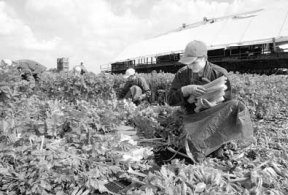Taken from SSP website
If anybody had any illusions that Gordon Brown was going to be a better and more principled Labour leader than Tony Blair, they were soon rudely shattered. When Brown declared his support for British jobs for British workers
, at the Labour Party Conference, he lifted a slogan straight from the BNP and National Front. His intervention made racist scaremongering respectable again. Both the TV and ‘quality’ press launched a media frenzy about the numbers of immigrants in the country, and the projected growth of the UK’s population by 2016.
If Brown was to make any attempt to implement his sound-bite policy, he would have to withdraw the UK from the EU. Tens of thousands of British workers, working abroad, would have to return home. Following the same logic, foreign-owned firms should be asked to close down their UK operations, and British firms be asked to confine their operations to the UK. Calls for repatriation (and worse) of all foreign-born workers would soon follow.
Racist posturing
It doesn’t take any imagination to see who benefits most from such racist posturing. Brown isn’t stupid, so why does he stoop to the gutter and imply support for a policy he has no intention of implementing? Attempts to hold on to the support of embittered and demoralised Labour supporters can’t be the whole answer. Such calls can only buy time. When they are not honoured, support will drift elsewhere, with the BNP being the most likely to benefit. They will be to the forefront of those pointing to yet another New Labour ‘pledge’ not honoured. They will play to the growing cynicism of an electorate that is losing sympathy for the mainstream parties.
There are two main purposes behind Brown’s call. Business, both big and small, wants to take advantage of cheap labour. The best way to do this is to have a two-tier workforce. New Labour’s drive to marginalise and outlaw immigrant workers is not so much designed to remove them permanently from the country, as to create a pool of workers who can be super-exploited. They have little or no recourse to legal protection. Furthermore, when such division is promoted between the two sections of the workforce – those with, and those without, rights – it becomes easier to fuel racist resentment and set worker against worker.
Dawn raids
Every now and again, there can be televised dawn raids, broken down doors, terrified children, police escorted removals and deportations, to show the government is acting ‘tough’. These activities are designed to whip up racist resentment amongst the legal workforce. They also push other outlawed migrant workers even further underground and hence make them even more vulnerable, in the face of a whole host of would-be exploiters.

A good example is the furore raised over all those eastern European workers who have arrived, particularly in England’s eastern counties. They mainly do menial work on farms, in food processing plants, and a whole host of service industries. The press has pointed out that these migrant workers are putting pressures on services such as schools. As it happens, the majority of these people are legal EU migrant workers, who pay tax. Nobody is asking why the large amounts of tax, which have been collected from these workers (with relatively few claims), have not been used to provide new services for the benefit of both indigenous and migrant workers and their families. No, their taxes, like those of other workers, are increasingly diverted to paying for endless wars, and to line the pockets of big business through PFI contracts. Instead, the government wants to divert attention from this shared reality, the better to divide workers and to set us against each other.
Those illegal workers, who don’t pay tax, are super-exploited by companies which make massive profits. These companies evade taxes on their profits. This situation could simply be ended by giving legal status to all workers, and by enforcing the minimum wage.
It is interesting to compare the treatment of commodities and profits, in the global corporate economy, with the treatment of migrant workers. Countless products, manufactured directly, or subcontracted, by global corporations, such as Nike, are made in semi-slave working conditions in Asia and elsewhere. These corporations ensure that the IMF, the World Bank and the World Trade Organisation enforce policies, which ensure the free movement of both their products and their profits. When it comes to the workers making these products and profits for companies, it is a very different story.
‘Deserving’ and ‘undeserving’
A misleading division is often made between asylum seekers and economic migrants. This suggests there is a split between ‘deserving’ victims of repressive political regimes and ‘natural’ disasters, and the merely economic and ‘undeserving’ job-seekers. The reality is that both movements of people are mainly a consequence of the political operations of global corporate capital, and of US/UK (and other state) sponsored imperialism.
Structural Adjustment Programmes have been imposed upon the ‘Third World’ to ensure that any government subsidies for health, education, fuel or basic foodstuffs are removed. State-owned companies have to be sold off, usually to global corporations. People are forcibly removed from their land. Agribusiness is promoting a ruthless policy of enforcing GM products to outlaw non-patented food production, leaving small producers at the mercies of hostile courts. Water is being privatised and access denied to non-payers.

As a consequence of all these policies, massively increased poverty is leading to more social tensions. These create the mayhem associated with inter-ethnic and inter-religious in-fighting. Warlords and gangsters make their own direct deals with the global companies. Where people actively resist, as in Colombia, corporations (backed by the US and UK) resort to death squads. Otherwise, imperial armies simply invade. Not surprisingly, millions of people are uprooted in the process and take, often desperate, measures to ensure their families are safe(r) and have some form of livelihood. These conditions explain why millions are forced to move around the world looking for work.
There is no problem for the rich and powerful when it comes to their international travel. Every country offers them motorway connections from the airports, luxury hotels and entertainment (including ‘cheap sex’). For the poor and outcast it is another story. They have to make tortuous journeys across the world, paying private people traffickers and bribing government and local officials. When (or if) they arrive at their destination, they are often employed by ruthless gang-masters. Women and children can end up as sex-slaves. The horrible deaths of ‘illegal’ migrants, found suffocated in a truck at Dover, or of the cockle-pickers drowned in Morecambe Bay, are but the tip of the iceberg. Unknown thousands die each year, drowned at sea, dehydrated when crossing deserts, or frozen to death, without adequate shelter. The fact that the conditions, and the abuse such migrants face, when they finally arrive, are so bad, just lets us know just how terrible the conditions are, from whence they have fled.
‘Naturalising’ the profits
Big business has no problem ‘naturalising’ the profits it makes from ‘illegal’ workers. The banks make no distinction between the differing origins – legal or illegal – of the money deposited with them. Once it has passed into their vaults or electronic accounts, it doesn’t matter whether it has its origins in profiteering from underpaid workers, drug dealing, prostitution, extortion, terrorism, or arms trafficking. Recycled, this money then becomes available to all ‘respectable’ and legal commercial borrowers. The Royal Bank of Scotland doesn’t want to know about the conditions workers face in the Burmese oil industry it helps to finance.
Big business asks no questions when it comes to the source of their profits. So we, in the SSP, should make no distinction between native-born and other workers, living in Scotland, when it comes to fighting for rights, or to winning support for a socialist future. We see ourselves as the representatives and organisers of that section of the international working class living and working in Scotland. We only recognise ‘illegal’ worker status in order to combat it. The fight to unite our class internationally, and to oppose all attempts to divide us, is as important today, as past heroic struggles to emancipate chattel slaves, to liberate women and to enforce workers’ rights. Indeed, the fight, to prevent the imposition of outlaw status on millions of workers, shows us that all three of these great campaigns still need to be re-fought.
When Marx raised the slogan, Workers of the World Unite
, he did not insert a prefix ‘Legal’ before ‘Workers’. This is why the SSP gives its full support to the ‘No One Is Illegal’ Campaign.
No One Is Illegal
c/o Bolton Socialist Club
16, Wood Street
Bolton
BL1 1DY
Website: http://www.noii.org.uk
E-mail: No One Is Illegal
Motion passed at October 2007 SSP Conference
The Scottish Socialist Party recognises that the global corporations, and the national state governments at their beck and call, are pursuing a vicious strategy to divide the international working class. Immigration controls are being used to force millions of people into illegal status. i.e. outlaws.
This is being done to promote two tier workforces with illegal workers being subjected to super-exploitation, constant harassment and demonisation. This strategy is also designed to promote fear and racism amongst those workers enjoying legal status and to force legal workers’ organisations, whether political or economic, to pursue sectional protective measures (e.g. increased tariffs on imports, migrant worker quotas) instead of upholding genuine working class international solidarity.
To counter this strategy of dividing the working class through immigration controls, this Conference agrees to support the No One Is Illegal Group, which campaigns:-
- i) in opposition to all immigration controls
- ii) for internationalism and global links
- iii) for the self-organisation of those affected by controls
- iv) for work within the labour movement
